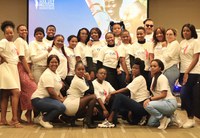
Soul City Institute Celebrates the First Anniversary of the Feminist Leadership and Activism Centre (FLAC)

We developed FLAC with the aim of creating a space for learning, healing, communicating, and working creatively and collaboratively to raise the feminist consciousness of young people.
The centre, whose impactful work has been made possible through the generous support of the Ford Foundation South Africa, continues to disrupt and transform multiple levels of oppression through profound feminist movement building. This work furthers the Institute's goal of advancing gender equity beyond mere empowerment, embedding intersectional feminism at the heart of societal change.
"FLAC is a catalyst for meaningful change. It's our flagship initiative, created to arm the next generation of African feminist with the knowledge, resources, and mentorship necessary to amplify the feminist movement across South Africa," says Phinah Kodisang, the CEO of Soul City Institute.
Over the past year, 20 emerging leaders aged 19-25 from across South Africa have been selected to participate in FLAC's comprehensive programme. This inaugural class has undergone an intensive curriculum exploring feminist methodologies, personal injustice, trauma and healing, feminist activism, movement building, and sexual and reproductive rights.
The curriculum, delivered by renowned African feminists and activists, is designed to equip fellows with the tools to challenge and disrupt patriarchal structures in all their forms, building a feminist consciousness and promoting social change.
“I applied (for FLAC) because I have always been interested and passionate about social justice and activism,” says Hlumela Dlali from Cofimvaba in the Eastern Cape. The 26-year-old does not identify with the gender binary, therefore using they/them pronouns.
As a queer person, Hlumela says that the highlight of their experience in the programme has been understanding more about their gender and sexuality, as well as realising the complexities of the feminist movement. “It’s not just about hating men,” they explain.
Hlumela one is also one of the fellows who have started a Rise Club. Theirs focuses on empowering young people through education and awareness about their rights. This, they say, will help them develop their leadership skills.
FLAC’s commitment to intersectionality encourages the exploration and validation of indigenous knowledge and practices. The centre fosters an inclusive, participatory, engaging, and experiential approach to teaching and learning, preparing young feminists to be agents of change in their communities.
The Soul City Institute envisions FLAC leading to group cohesion and action, nurturing personal and collective feminist consciousness among the cohort, and fostering generations of young people empowered and liberated through decolonial feminist thought.
"As we celebrate FLAC’s first anniversary, we reflect on the changes we've ignited over the past year," kodisang states. "Our mission goes beyond education - it's about creating a space for healing, communication, creativity, and collaborative work. We are resolute in our mission to dismantle the intersecting systems that oppress gender minorities and hinder them from reaching their full potential."
FLAC's launch and ongoing success come at a pivotal moment in South Africa's history, where there is a collective push for feminist approaches to gender equity and social justice. The Soul City Institute gratefully acknowledges the Ford Foundation South Africa for its unwavering support and commitment to FLAC's mission.
About the Soul City Institute for Social Justice
The Soul City Institute for Social Justice is a South African non-profit organisation dedicated to advocating for social justice and health equity. The Institute operates numerous programs, including the Feminist Leadership and Activism Centre (FLAC), designed to empower people through feminist education and activism.
For media queries
011 771 7973
disruptingpatriarchy@soulcity.org.za
Note: High-resolution photos, logos, and interview opportunities available upon request.
